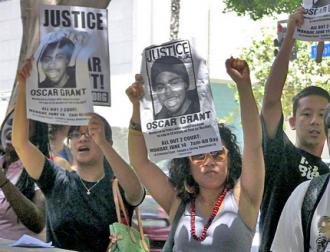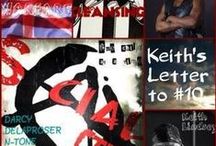's two sons were on an Oakland BART platform with Oscar Grant III in the early morning hours of New Year's Day in 2009 when BART officer Johannes Mehserle pulled out his weapon and fired a bullet into the unarmed and handcuffed Grant. Despite shooting an unarmed man in the back, Mehserle served less than a year in jail before being released.
Bryson became a leading voice of the campaign to win justice for Oscar and his family, and to confront the ongoing epidemic of police brutality. In this slightly edited version of a comment written on Facebook following a recent visit to an Oakland, Calif., junior high school, he explains the importance of the ongoing struggle for justice.
 Protesters demand justice outside the courtroom where Grant's murderer went on trial (Thandisizwe Chimurenga)
Protesters demand justice outside the courtroom where Grant's murderer went on trial (Thandisizwe Chimurenga)
THIS EVENING, I was invited to a junior high school in Oakland, Calif., to hear students do poetry. When I got there and looked around, I saw pictures of Harriet Tubman, Che Guevara, Malcolm X and Martin Luther King Jr. I saw pictures of freedom fighters around the classroom.
When I got there, the students were getting ready to speak. It was an art and poetry program. As I was looking at the artwork, I was impressed, because the students drew what they felt. I noticed a lot of guns, and when a student was explaining it, he was talking about the violence in his community.
There was also a lot of art with hands that have chains on them. They explained that the chains represent them feeling oppressed by the police and the system. These were eighth graders. The amazing thing is that this is how they felt. When I saw the chains on the hands, I thought about Steve Biko and the movie Cry Freedom. When I looked on the wall, I saw a picture of Nelson Mandela.
I was impressed, because when I was in the eighth grade, I wasn't conscious at all. I was focused on smoking weed, playing basketball and football, and chasing young ladies. When I was in this classroom, I was thinking to myself that I wish I had been a little more conscious when I was younger.
When I looked around the classroom, I noticed that there was a memorial on the floor, with candles. The first picture that I saw in the memorial was a picture of Oscar Grant. Next to Oscar Grant was a picture of Tupac Shakur. I was amazed by the legacy of Oscar and Tupac, for these kids to have a memorial including them. Most of these kids weren't born when Tupac was murdered, and they were only 7 years old when Oscar was murdered.
- - - - - - - - - - - - - - - -
THEY WERE reading their poetry and spoke about the oppression of the system, as if there is no future for them. As I was standing against the wall, I noticed that one student kept staring at me. When his time came to speak, he sat in the chair, and he looked at me. He read one of the nicest poems I've heard about Oscar Grant. When he was reading his poem about what happened to Oscar Grant, I got emotional to hear this young kid say these things about Oscar. It opened up what I've been trying to close out, in a good way.
I thought about Wanda, Oscar's mother. I thought about [Oscar's partner] Sophina and [his daughter] Tatiana. I also thought about Oscar's friends who were on the platform with him that night, as the kid read his poem. When he was finished, the kid was smiling, and he looked at me. When he walked by me, I shook his hand and gave him a hug.
Then another kid got up there, and he did the same thing--he spoke about Oscar Grant in his poem. I got a little emotional because it took me back. So I went out in the hallway. I looked on the wall and noticed that most of the writings on the wall were about Oscar Grant. I was just amazed. Here it is five years later, and the legacy of Oscar Grant continues.
The part that blows my mind is the pictures of Harriet Tubman, Martin Luther King, Malcolm X were there along with Oscar Grant's picture. I guess what I am trying to say is that Oscar's mother always told me from the beginning, when he was murdered, that "You're not fighting for nothing, Jack." Back then, I didn't understand it.
She would say, "You may not see it now, but you'll see it later." I guess I saw it today in this classroom. Even though I didn't see it then, through these kids today, I saw it. As I was walking out of the classroom, I saw written on the wall, "There is no victory without pain."
As I was reading that, I thought about Oscar's mother, Wanda, and all of the things that she used to tell me, and the things she prepared me for. I called Wanda and told her that she was right, saying that Oscar's legacy is alive. I was happy to tell her that--that these young students are keeping Oscar's legacy alive. It meant a lot to her.

No comments:
Post a Comment